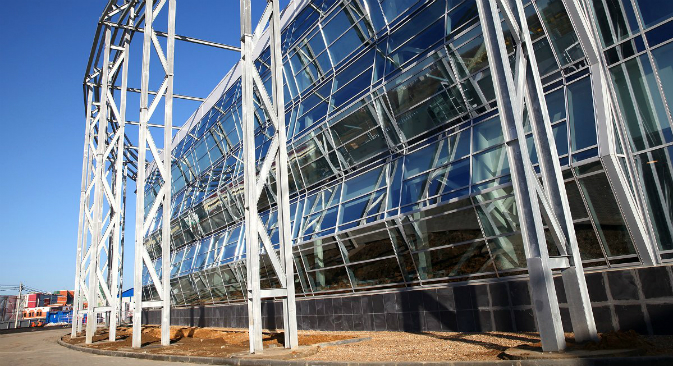Russia boosts construction of data centers

Moscow-based RD Construction built a data center for Russian telecommunications giant Beeline in Yaroslavl (a region adjacent to Moscow). Source: Press photo
The construction of data processing centers (DPC), which offer cloud and colocation services, has become a new growth driver for the Russian IT industry.
The Russian commercial data processing center market was estimated to be worth $167 million at the end of 2014, and witnesses a yearly growth of over 20 percent, consulting company Direct INFO said in a report.
Experts predict continued segment growth in the next three years due to the development of cloud computing, Big Data and the B2G (business to government) market.
The share of Russian data centers in the world market is below 0.5 percent, but Russian companies see bright prospects for domestic growth, thanks to the legislative initiatives of the government.
On September 1, 2015, the Law on Personal Data, which forbids companies from storing personal data of Russian citizens in servers outside Russia, enteres into force.
“The law will be another growth driver. Certainly, we observe the growth of this market in Russia,” says Oleg Zhukov, Chief Executive of RD Construction, which specializes in the construction of data centers.
“We have not yet received orders from international players, but thanks to the new law, we have been approached by state institutions, which actively began to transfer corporate e-mail and websites from external hosts to our servers,” says Mikhail Anopin, co-owner of Smart Unit, the only commercial data center in the Republic of Yakutia.
Profitable location
The most sought after venue to set up a data center is Moscow. 16 of the 20 largest data centers of the country operate in the capital, each of which contains more than 1,000 racks and has a total capacity of 12 MW on average.
A large-scale construction is planned in the Skolkovo Technopark in the Moscow Region, the ‘technological Mecca’ for Russian startups.
At the beginning of 2015, Russia's largest bank, Sberbank, announced plans to build its own data center there, with 5,000 sq m of server room space and 2,000 racks.
“In 2009, Russia had 110 data centers, by the end of 2014 – about 180, with 60 percent located in Moscow,” Zhukov says.
According to him, telecommunication operators have been the main clients of data centers in Russia in the recent past.
In 2014, the Moscow-based RD Construction built a data center for Russian telecommunications giant Beeline in Yaroslavl (a region adjacent to Moscow). One of the largest in Russia, the data center has received an international Tier III compatibility certificate.
“Russia now has very few companies that can build centers of this standard,” Zhukov says. In recent years, large-scale infrastructure projects in Russia have been built mostly by foreign companies, mainly Turkish ones, he adds.
Cold means cheap
The cold Russian climate is perfect for date storage and does not require additional costs on year-round re-cooling systems, which makes its favorably different from the weather in Silicon Valley, or its equivalents in India, China, Malaysia and the United Arab Emirates.
Siberia and the Russian Far East, where construction of the first data center has just begun, can prove most advantageous in terms of climate and access to energy.
In 2015, the Siberia IT cluster managed to attract $250 million from a local investor to build the first commercial data center in Omsk.
According to the plans of the founders, the construction of the center with a total area of 10,000 sq m and a capacity of 2,000 racks is to be completed in 2018 with a payback period of five years.
“We want to enter the international market after receiving a Tier III certificate,” says Dmitry Butsik, co-founder of the data center and president of the Siberia IT cluster.
According to him, the data center in Omsk will be competitive due to the low cost of services.
“Firstly, we have the cost in rubles. Secondly, the Siberian climate allows saving on a re-cooling system, since cooling is required only three months a year,” he explains.
A large data center is being planned in the Far East, within the framework of the future IT park in the Republic of Yakutia.
According to Petr Gabyshev, deputy director of the Yakutia Technopark, Russian telecom operators Megafon, Beeline and MTS are all interested in the new data center.
“Maintaining a large data center in Yakutia will cost 30 percent less than in Moscow,” Anopin points out.
All rights reserved by Rossiyskaya Gazeta.
Subscribe
to our newsletter!
Get the week's best stories straight to your inbox


